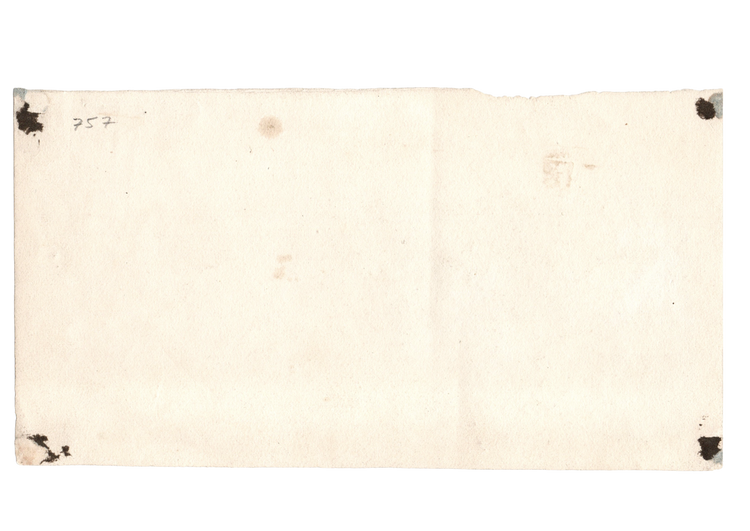Exposing slave-owner hypocrisy in word and image
- Regular price
- €4.000,00 EUR
- Regular price
-
- Sale price
- €4.000,00 EUR
- Unit price
- per
Anonymous artist.
Slavery drawing (cartoon).
Anglo-Caribbean, ca. 1820.
Watercolour and ink on thick wove paper, 15 × 27.5 cm. No watermark.
This striking watercolour depicts a plantation scene in which a seated slave owner idly supervises the flogging of an enslaved man. The master, a big-bellied white man in a red coat and yellow breeches, lounges beside a bottle and glass of wine, while an enslaved Black servant reads aloud from a large open volume titled Law. In the background, a white overseer administers lashes to a bound Black figure as other enslaved Black people look on from behind a fence.
To the right of the image is an extensive pencil inscription reproducing a dialogue between the master and the enslaved man:
“We must teach these idle rascals that they are not their own masters yet. Thirty lashes by way of a hint, and if that does not bring them to their senses, why we must double the dose. ‘Masta, masta, yoo no tink dis hurt, but hurt it do! You no do dis when I’m free man: den you see wedder I don’t give masta white a suck at de same cane! He no let off wid thirty lash, him have double lowance. Your day now, mine anoder [sic] time!’”
This drawing merges text and image in the tradition of early nineteenth-century moral satire, contrasting an idle, self-satisfied slave owner with the brutal punishment of an enslaved man to expose the hypocrisy of the slave-holding class. Although framed in the racist conventions of the period, the dialect speech imagines a future reversal of power and gives voice to an act of resistance. Stylistically akin to British satirical artists such as Rowlandson and Cruikshank, the work belongs to the broader abolitionist and colonial-critical visual culture flourishing between the abolition of the slave trade and emancipation. Its subject matter—and particularly the distinct Caribbean dialect used in the inscription—strongly suggests an Anglo-Caribbean origin, likely from a personal sketchbook or commonplace book engaging with contemporary debates about slavery.
Condition: a few minor spots, otherwise in very good condition.
Couldn't load pickup availability
Share


Contact
Email: hugo@artemrarebooks.com
Phone: +31651042297
Visit us on appointment at:
Former US Embassy
Lange Voorhout 102
2514EJ
The Hague (The Netherlands)
Shipping address:
Nannie van Wehlstraat 51
2548MN
The Hague
The Netherlands


